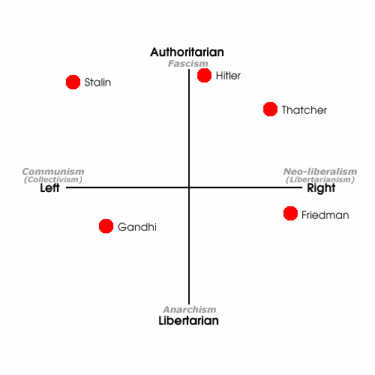 It is almost always a mistake to try to apply the mantra: Keep It Simple Stupid to our attempts to understand the society we live in. Human being are complex creatures and trying to give us all simple labels in the same way one would species of Jellyfish will inevitably lead you to an incorrect conclusions. Perhaps the best example of this is the rather annoying way that every political viewpoint gets classified as either left or right wing.
It is almost always a mistake to try to apply the mantra: Keep It Simple Stupid to our attempts to understand the society we live in. Human being are complex creatures and trying to give us all simple labels in the same way one would species of Jellyfish will inevitably lead you to an incorrect conclusions. Perhaps the best example of this is the rather annoying way that every political viewpoint gets classified as either left or right wing.One of the least constructive lessons of my educational career was an A-level politics class that was entirely taken up with the lecturer trying to convey to the class what the difference between a left wing and a right wing view was. He was struggling because they are purely arbitrary labels with no real meaning: there is no logical reason why wanting to renationalise the railways means that you are opposed to the death penalty. So providing a clear definition of them was something of a challenge.
Thinking in terms of left and right is a certain way to stop political creativity. An effective policy maker should be able to use every tool at their disposal without worrying about whether it is left wing or right wing. The hugely positive reaction to the New Labour sound bite: ‘tough on crime, tough on the causes of crime,’ suggests that this is something that most of us instinctively understand.
The idea that all political viewpoints are reducible to two simple opposites encourages the dangerous idea that ‘my enemy’s enemy is my friend.’ An example of this is are the strange views of John Pilger, which I wrote about a few days ago. I suspect that part of what drives Pilger to the conclusion that the like of Chavez and Castro are good leaders is a train of thought that runs something like this: ‘I am a left-winger who is opposed to American conservatives who are right wingers. Castro and Chavez also oppose these right wingers so must be like me left wingers and therefore friends of mine.’ I would hope that it goes without saying that, this is not a particularly sensible approach.
The terms left and right come from post-revolutionary France. In the assembly that governed France after the overthrow of the monarchy, those who wanted to restore the King to the throne sat on the right while those who wanted to behead him sat on the left. In this context and this context only does right and left make sense. Otherwise it is a nonsense.
The specific context of these terms has become a particular problem as more attention is given to non-western politics. Where as the politics of countries that had been shaped in part by the French revolution could usually be forced into the left and right straightjacket, this became impossible in countries with their own distinct political traditions. Take Taiwan, the main divide in its politics is between those who support independence and those who wish to remain (formally at least) part of China. How can this divide possibly be related to the seating arrangement of a two centuries old French parliament?
As long as people insist in reducing politics to a simple dichotomy the enormous diversity of ideologies, interests and ideas that drives modern politics will be obscured and we will only ever have a partial picture.


No comments:
Post a Comment